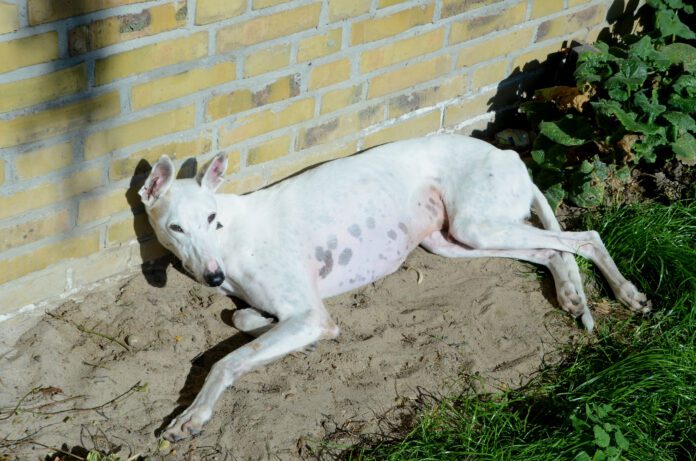On sunny days, we rub sunscreen on ourselves and our kids, but what about our dogs? Should we protect them, too? Yes! – some dogs absolutely benefit from sunscreen!
What dogs need sunscreen?
Hairless breeds, dogs with white or thin coats, and dogs with pink or light-pigmented noses and eyelids are at higher risk of sunburn and sun damage than other dogs. So are dogs experiencing hair loss from seasonal shedding, shaving, or health conditions that cause coat thinning. And dogs with “snow nose,” a seasonal pigment change from black to pink, may need winter sun protection.
What sunscreen is safe for dogs?
Sunscreen made specifically for dog is safe for dogs. Unheard of a few decades ago, sun protection products for dogs are widely sold as lotions, sprays, sticks, balms, ointments, and clothing. Some brands claim an “SPF equivalent” rating that compares their products to human sunscreens, such as SPF 15, 30, or 40.

Dog-safe sunscreens do not contain zinc oxide or para-aminobenzoic acid (PABA), which are commonly found in human sunscreens and which are toxic to dogs.
When comparing products, look for sunscreens that match your dog’s lifestyle. Some have to be applied 15 to 20 minutes before sun exposure, while quick-drying sprays offer instant protection. Waterproof products are recommended for swimming dogs.
If your dog has sensitive skin, test new products for allergic reactions by applying sunscreen to a small area of bare skin. Check it after 24 to 48 hours for signs of irritation and if it causes a reaction, try a different product.
If your dog’s skin proves too sensitive for any topical sunscreen product, look for sun shirts or sun suits for dogs that cover most of the body. Some protective clothing also repels mosquitoes and other insects. Hats and goggles designed for canine use can be useful as well.
How to protect your dog from the sun
There are two main ways to protect your dog from the sun: dog-safe sunscreen and avoid or limiting intense sun exposure.
- Dog sunscreen: Labels indicate how often a sunscreen should be reapplied. Apply sunscreen to areas that will be most exposed to sunlight, yet avoiding eye areas:
- the bridge and tip of your dog’s nose
- ear tips
- skin around the lips
- inner thigh
- groin
- wherever pigmentation is light
If using a lotion that needs time to be absorbed, keep your dog distracted (so he doesn’t lick it off) by playing in the shade or indoors.
- Limit sun exposure: Avoid or limit activities during the sun’s most intense exposure times, which are mid-day between 10:00 a.m. and 2:00 p.m. Whenever possible, keep your dog in the shade during those hours – and as much as your dog may enjoy soaking up some rays, don’t let your dog lie in the sun, especially on concrete or light-colored surfaces.
How to treat sunburn on dogs
Sunburns develop when dogs are overexposed to ultraviolet light; this can happen in as little as half an hour of sun exposure. Whenever you notice reddened, flaking, or warm-feeling skin, bring your dog indoors or into the shade. Treat your dog with:
- Cool water
- cool compresses,
- dog-safe soothing ointments
- aloe vera gel (can help relieve initial sunburn symptoms
Call your veterinarian if the burn is serious. Sunburns worsen allergic dermatitis, autoimmune skin conditions, and mange, and sunlight can trigger discomfort or complications at surgery sites. Any dog with a history of sunburn should be protected from future sun exposure to prevent complications.






